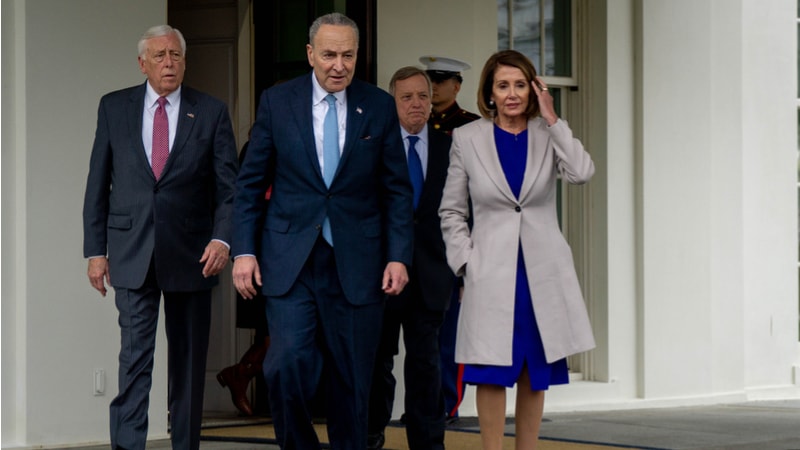
Senate Majority Leader Chuck Schumer, D-N.Y., said today that Federal government investment in the artificial intelligence arena is being reckoned at a minimum of $32 billion based on consensus emerging from the Senate’s second in a series of AI forums held on Oct. 24.
The Senate AI forum events are closed-door meetings that feature input from AI industry experts, with the aim of educating senators on the emerging technology and the course of any action the government may take that would impact AI.
“The second forum … said not only should government be involved, but it needs significant resources and a broad spectrum of people on the panel agreed that that should be – including our Republican friends,” Sen. Schumer said during the Washington Post Live’s AI Summit on Oct. 26.
“The minimum number that was talked about was $32 billion … [to] invest in many different things,” the senator said. “And that’s part of the goal of the forum to figure out where to invest and where not to, how to encourage the private sector in places to go forward.”
The first bipartisan AI forum was held on Sept. 13 – led by Sens. Schumer, Martin Heinrich, D-N.M., Mike Rounds, R-S.D., and Todd Young, R-Ind. – and hosted a gaggle of big tech CEOs, including X’s Elon Musk and Meta’s Mark Zuckerberg.
The bipartisan leadership of the AI insight forums said the meetings will be used to get information from those working with AI to members of Congress – with a goal of laying the foundation for bipartisan legislation on the fast-moving technology.
Sen. Schumer announced the AI insight forums earlier this summer, noting that he will begin inviting “the best of the best” to convene in one room to do “years of work in just months.”
During the Washington Post Live’s AI Summit today, the Senate Majority Leader touted that the next forum, to be held next week on Nov. 1, will focus on the workforce.
“One of the great problems people bring up with AI – average folks – we’re going to lose millions of jobs. How do we deal with that issue,” Schumer questioned. “And so, workforce is important. And that’s positive and negative. How do we train people because there’s going to be millions of new jobs that are created by AI, but also how do we deal with people who might lose their jobs because of AI?”
After the workforce issue, Sen. Schumer said the next AI forum will focus on high-impact areas. “There are areas right now where AI is having an effect – finance, healthcare, that kind of stuff. And they’re having an effect on people. Are they doing it in the right way or is there bias? Because there’s built in bias in the database is because of centuries, decades at least, or centuries of discrimination and all of that. And so, we’re going to have to look at those things,” the senator said.
While a date isn’t circled on the calendar yet, the senator said another AI forum will happen “rather soon” and will focus on election reform, “and that’s the one we may have to move the most quickly on, because the elections are coming up.”
These forums will immediately follow the expected release of the Biden-administration’s much-anticipated AI executive order on Monday, which Sen. Schumer said he believes demonstrates how seriously the President is taking this issue. However, there’s only so much President Biden can do in the way of an executive order, the senator said.
“There is probably a limit to what you can do by executive order,” Sen. Schumer said today. “They’re concerned and they’re doing a lot regulatorily, but everyone admits the only real answer is legislative.”
The Senate Majority Leader didn’t offer any new insight into how far along Congress is in creating comprehensive AI legislation but reiterated that it’s not a process they can speed along too quickly.
“It’s not going to be days or weeks before we put out proposals, but it’s not going to be years either. We have to do it in months-type time,” Sen. Schumer said.
The senator said he hopes legislation will be available before the next presidential election in 2024, but if it’s not, he’s not opposed to moving pieces along separately – like watermarking AI generated content, or more strictly, banning the use of AI to generate deceptive content to influence Federal elections.
He emphasized the need for guardrails in AI. “This is difficult, but so important,” he said. “Certainly, if we do nothing, the outcomes will be worse than if we do something that’s decent.”
